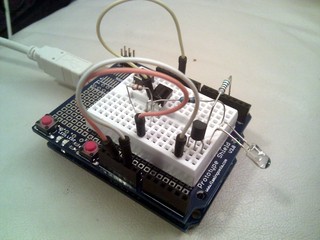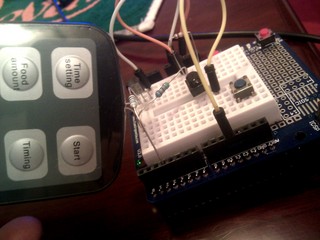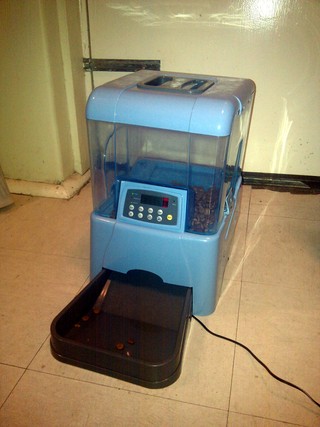Android controlled cat feeder - Hardware
Hardware
The hardware is really easy, I havent even bothered with a schematic as it is basically just an IR LED on an Arduino. The overall parts are:
Electronic cat feeder
Easily found on eBay, some of them are
of the fixed portion type, a large bowl with a motorised cover that
opens compartments sequentially. This is not ideal for me, as it only
gives 4-5 servings. The other vital feature is the IR remote. Without
it, interfacing could be challenging. I bought the Nursemaid feeder (and
my software is programmed with its codes)
Arduino with an IR LED
Very little explanation is needed here,
just wire up the LED via a 68 ohm resistor from port 3 to ground. I
went for a little more power via a transistor, but a direct connection
also works for up to about a metre. Erm yes...you should also make sure
the Arduino and IR LED are in range of the cat feeder. At the moment
I am dedicating an Arduino to this task, but normally once I have
a prototype complete, I build a proper PCB with an AVR, freeing up
the Arduino hardware for other prototypes. However
I'm moving soon, so will leave it in the Arduino until I know what
options I'll have for interfacing near the feeder in the new house.
IR receiver module
You may need this to discover the codes
that the feeder uses. Details of how to hook it up are described on the
IR library page. If you're using the Nursemaid feeder, my code already
transmits for this feeder.
Linux device with USB port
You can use any linux box, as long as it has a USB port and recognises
the FTDI serial/usb chip on the arduino. Dont forget to make sure
you can enable incoming connections to this device from the outside.
Android phone
Or really, anything that can send an HTTP request.

 That's pretty much it as far as hardware goes. Read the software
page next.
That's pretty much it as far as hardware goes. Read the software
page next.
I can be reached at bb @ cactii . net
